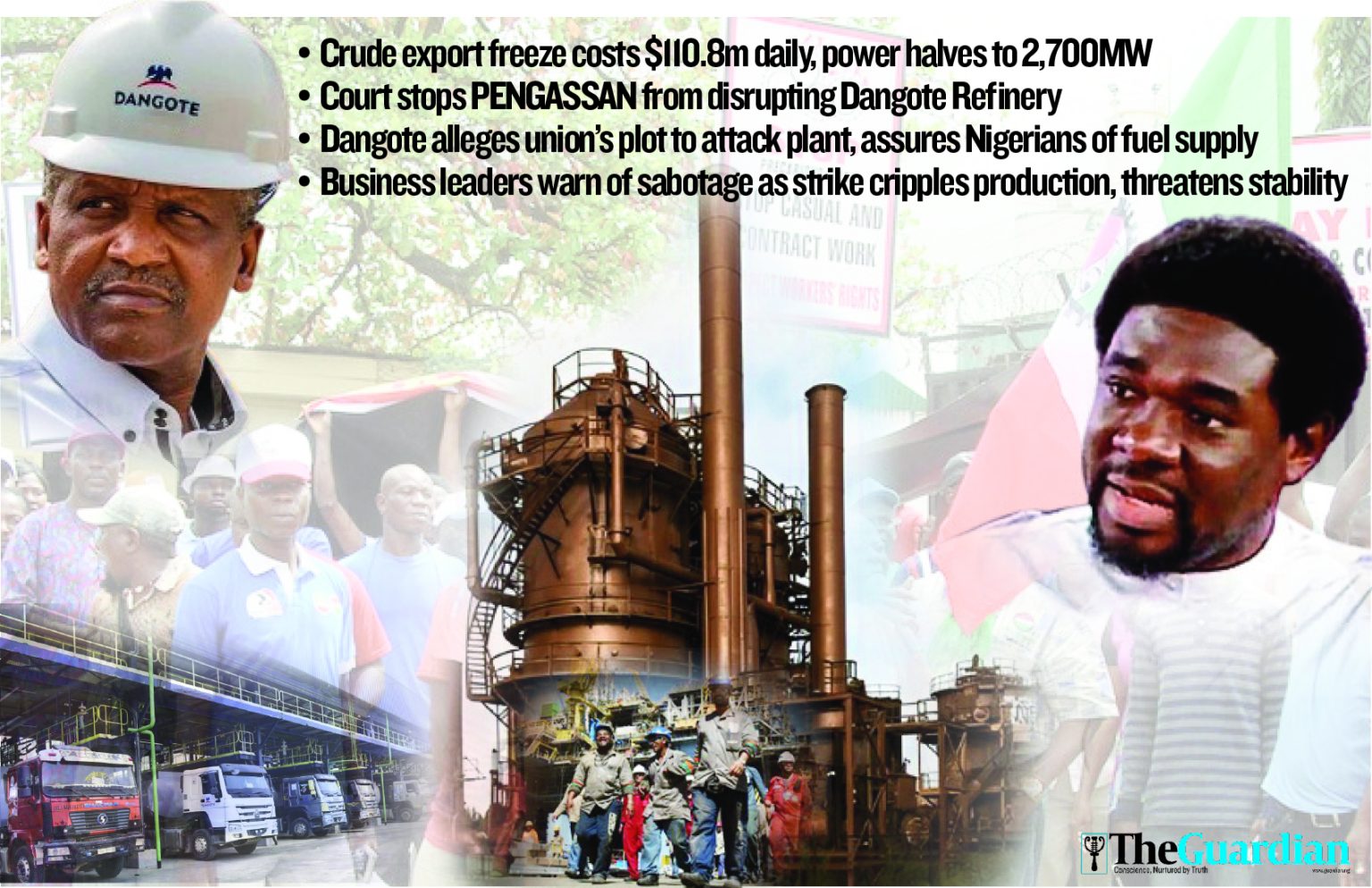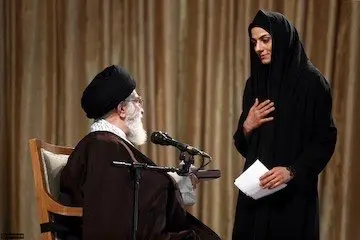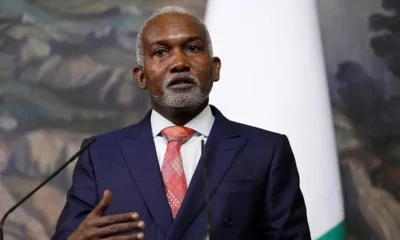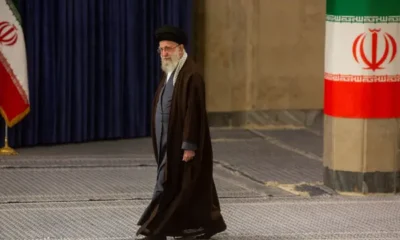News
Gas users groan as PENGASSAN strike crashes power generation, exports

Crude export freeze costs $110.8m daily, power halves to 2,700MW
Nigeria’s economy is reeling from the escalating strike by the Petroleum and Natural Gas Senior Staff Association of Nigeria (PENGASSAN), which has stalled oil and gas exports, disrupted petroleum supply, and left power plants starved of gas.
By midday yesterday, national electricity generation had dropped to approximately 2,700 megawatts, nearly half of the normal output. Daily economic losses from the inability to export crude are estimated at $110.8 million, with growing risks of breaching international supply contracts.
The union is protesting the alleged illegal dismissal of over 800 Nigerian workers by Dangote Refinery. The company, however, said the reorganisation that led to the layoffs was meant to prevent sabotage, insisting the move was neither arbitrary nor malicious but aimed at addressing safety concerns and improving efficiency.
The nationwide shutdown, triggered by the dismissal of workers at the Dangote Petroleum Refinery, has paralysed operations at key institutions, including the Nigerian National Petroleum Company Limited (NNPC), the Nigerian Upstream Petroleum Regulatory Commission (NUPRC), the Nigerian Midstream and Downstream Petroleum Regulatory Authority (NMDPRA), and the Petroleum Technology Development Fund (PTDF).
The strike has also reignited debate about the limits of union power, prompting backlash from government agencies, industry experts, and the wider public. With the Trade Union Congress (TUC), led by a former PENGASSAN president, backing the action, the dispute has evolved into a high-stakes test of strength between organised labour and Africa’s largest private refinery.
The action, which many have described as a dangerous escalation of union overreach, threatens to deepen Nigeria’s economic vulnerabilities, undermine investor confidence, and push the country toward another round of fuel shortages and power instability.
Reacting, a former President of the Chartered Institute of Bankers of Nigeria, Prof Segun Ajibola, said that while unionism is a fundamental right, it must operate within legal and national security boundaries.
“Fundamental rights are not absolute. There must be checks and balances,” he noted. He explained that unions historically emerged to protect vulnerable workers from exploitation, but over time, many have become overzealous. Across health, education, aviation, oil and gas, and electricity, we have seen excesses that undermine national stability,” he said.
Ajibola recalled how some private universities and banks barred unions while offering superior service conditions, thereby removing incentives for unionisation and ensuring industrial peace.
He stressed that while unionism cannot be outlawed, legislative guardrails are essential to prevent destructive activism. “National assets must be protected from any destructive tendencies of unionism. What is required is wisdom, not muscle flexing,” he warned. Investment and infrastructure expert Joseph Tsavsar was more direct, describing the strike as “economic sabotage.”
“Unionism is a right, but it should never be political or a threat to national assets like oil and gas. Once it crosses that boundary, sanctions must follow,” Tsavsar said.
He linked the current challenges to past union missteps, citing the privatisation of the power sector. Instead of prioritising the long-term sustainability of the sector, he argued, unions focused on retirement benefits and dues.
“That is why the assets were handed out as scraps. The same happened in NNPC refineries; huge salaries were paid even when no production was taking place.”
Tsavsar warned that attempts to replicate this culture at the Dangote Refinery were unacceptable. “No private investor will tolerate corruption that cripples operations. If government fails to act, investor confidence will be destroyed.” Energy lawyer Emeka Okwuosa urged both Dangote Refinery and the federal government to seek immediate judicial redress.
“Unionism is a right, but the way it is practised in Nigeria stinks. Leaders are selfish, corrupt, and overly political,” Okwuosa said. He described the strike as an overreach that must be curbed.
“You can strike without blocking refinery gates or switching off gas supply. These are acts of impunity that damage the economy. Government must regulate union practices more strictly and ensure credible leaders are elected under transparent supervision.”
Okwuosa warned that unless the situation is brought under control, Nigeria faces another round of fuel queues and soaring pump prices, at a time when the economy can ill afford further instability.
While unions insist they are defending workers against corporate excesses, critics argue that their tactics often cross into sabotage, undermining investment and damaging already fragile national infrastructure.
With losses mounting daily, experts say the federal government must act swiftly to mediate the conflict, establish clear legal limits to union power, and ensure both private and public investors are shielded from disruptive activism.
Court stops PENGASSAN from disrupting Dangote Refinery
● Firm alleges union’s plot to attack plant, assures Nigerians of fuel supply
The National Industrial Court in Abuja has halted the planned nationwide strike by the Petroleum and Natural Gas Senior Staff Association of Nigeria, which was aimed at shutting down the Dangote Petroleum Refinery.
In a ruling yesterday, Justice Emmanuel Sublim issued an interim order restraining PENGASSAN and its affiliates from cutting crude oil and gas supplies to the multi-billion-dollar facility. He warned that the planned strike could deal a heavy blow to Nigeria’s fragile economy.
The order also restrained the Nigerian National Petroleum Company Limited, the Nigerian Midstream and Downstream Petroleum Regulatory Authority, and the Nigerian Upstream Petroleum Regulatory Commission from executing any directive by PENGASSAN to choke supply lines to the refinery. The case was adjourned until October 13 for a hearing.
Meanwhile, Dangote Petroleum Refinery has assured Nigerians of an uninterrupted supply of petroleum products, including petrol, diesel, aviation fuel, kerosene, and cooking gas, despite the union’s threat.
The assurance came amid reports of a planned attack on the refinery, allegedly involving PENGASSAN members and hired thugs. According to intelligence sources, the plot is designed to disrupt critical units of the facility, particularly those responsible for petrol production.
Over the weekend, PENGASSAN directed its branches in oil majors, including TotalEnergies, Chevron, Seplat, Shell Nigeria Gas, and Oando, to shut down all crude oil valves supplying the refinery. “All crude oil supply valves to the refinery should be shut. Loading operations for any vessel headed to the refinery should be halted immediately,” the union declared.
In response, Dangote Petroleum Refinery described the directive as “lawless acts and sabotage against Nigeria and its people,” insisting that the union’s claims of anti-labour practices were unfounded. The company reiterated that its recent internal reorganisation was intended to curb repeated sabotage within critical units and was not targeted at Nigerian staff.
“More than 3,000 Nigerians remain fully employed at the refinery and continue to have unrestricted access to the facility,” the company stated, adding that only a very small number of staff were affected by the review process.
Sources confirmed that the refinery has requested heightened security and surveillance, warning that the alleged plot is already at an advanced stage.
“We are calling on security agencies to be on alert as this plan is targeted at crippling the operations of the refinery and preventing the supply of refined petroleum products, especially petrol,” one source said.
The company further alleged that the planned disruption is part of a broader strategy to undermine Nigeria’s progress in domestic refining and push the country back into dependence on imported fuel.
“Despite the sabotaging acts of PENGASSAN and its allies, Dangote Refinery is determined to continue with uninterrupted production and supply of petroleum products to the Nigerian people and businesses,” another source noted.
The refinery stressed that heightened surveillance is essential, as intelligence indicates PENGASSAN’s plan to physically sabotage its facilities by targeting critical units to enforce shutdown threats.
Business leaders warn of sabotage as strike cripples production, threatens stability
Director-General of the Manufacturers’ Association of Nigeria (MAN), Segun Ajayi-Kadir, described the situation as “unfortunate and disappointing,” warning that the absence of gas supply could destabilise the economy, cause widespread hardship, and distort business operations beyond the union’s intentions.
“It is economic sabotage for PENGASSAN to disrupt the economy since it is targeting a company. Dangote has the right to protect its investment. We are talking of a $20 billion investment, and you cannot afford to have individuals or staff in your organisation whose purposes are not aligned with your business interests. Just as the average worker has a right to unionise, the employer also has a right to employ or not employ, or to end employment,” he said.
He noted that the financial losses had not yet been quantified. “We needed to get an indication from the companies impacted. Before the close of work yesterday, we expected to have an idea, and that is if supply is not restored. I heard the group leader say that if they can reach an agreement within an hour or so, supplies should resume. It may be too early to ascertain the total losses,” he said.
Ajayi-Kadir advised businesses reliant on gas to always have a backup plan. “We must always have backup as long as we have these kinds of elements playing in the space. That way, businesses are not disrupted because we operate under very strict timelines,” he added.
Chief Executive Officer of the Centre for the Promotion of Private Enterprise (CPPE), Dr Muda Yusuf, said shutting down the oil and gas sector could cripple the nation, describing it as “the lifeblood of the economy” in terms of energy, foreign exchange, and revenue.
He warned against risking national stability for the interests of a few workers, calling PENGASSAN’s action unjustifiable. “What about those who have invested? What about consumers and other investors in the value chain? Their interests matter too. The union should not be this selfish, inflicting such pain and disruption on the economy,” he said.
Yusuf estimated the economic losses at “billions of naira.” “You shut down and disrupt the entire process. By the time you resume, you must start over. The same goes for power stations, which depend on gas. This kind of impunity must not continue just because some people have power over strategic sectors,” he said.
Chairman of Power Gas, Victor Eburajolo, appealed for a quick resolution to avoid disruptions to his company’s clients. “We have our own trucks, but we don’t know if PENGASSAN will shut down the companies we supply. I pray the situation is resolved,” he said, urging the union to suspend the strike while talks continue.
In the food and beverage sector, President of the National Union of Food, Tobacco and Beverage Employees, Ibrahim Garba, warned that “one minute is important in the production sector. If you lose one minute, it is a big loss, let alone hours, as billions could be lost.” He added that companies dependent on gas and solar had quickly switched to alternative sources and stored enough gas to sustain production.
The Nigerian Association of Chambers of Commerce, Industry, Mines and Agriculture (NACCIMA) expressed deep concern over the nationwide strike threatened by the Petroleum and Natural Gas Senior Staff Association of Nigeria in its ongoing dispute with Dangote Petroleum Refinery.
National President of NACCIMA, Jani Ibrahim, described the situation as “very troubling”, warning that if not urgently addressed, the conflict could disrupt energy supply, paralyse transportation and manufacturing, and significantly weaken public services across the country.
“A nationwide shutdown in the energy sector at this time would be a crippling blow to Nigeria’s stabilising economy,” he said.Ibrahim noted that the business community was alarmed by the possible consequences of the dispute on jobs, inflation, and investor confidence. “Dialogue is not optional; it is urgent and necessary,” he added.
He called on the Federal Government, PENGASSAN, and the management of Dangote Refinery to return to the negotiation table immediately, stressing that industrial peace and constructive dialogue are vital to protecting livelihoods, restoring investor confidence, and safeguarding Nigeria’s refining capacity.
Reiterating NACCIMA’s readiness to support and, if necessary, facilitate dialogue in the national interest, Ibrahim warned that the looming strike posed a clear and present danger to the economy, with jobs and livelihoods at risk.
“NACCIMA, on behalf of the business community, appeals for urgent intervention, industrial peace and the prioritisation of national interest,” he said.
Protesters shut offices, knock Dangote on sackings, licence breaches, foreign labour
PENGASSAN had on Saturday directed its members across the country to withdraw their services starting yesterday. By Sunday, they had shut down the Dangote Refinery and fertiliser plants.
In a circular issued after an emergency National Executive Council meeting on September 27, 2025, and signed by General Secretary Lumumba Okugbawa, the union accused Dangote of violating Nigeria’s labour laws, the Constitution, and International Labour Organisation conventions by sacking workers for joining the association.
According to PENGASSAN, the company has subjected Nigerians to some of the worst working conditions in the oil and gas sector. The union resolved that all processes involving gas and crude supply to the refinery should be suspended immediately and directed all International Oil Companies (IOCs) to reduce gas production and halt supply to Dangote Refinery and Petrochemicals.
Following the directive, PENGASSAN members barricaded the headquarters of the Nigerian National Petroleum Company Limited (NNPCL) in Abuja, blocking access to the premises. Similar actions were taken at the Nigerian Midstream and Downstream Petroleum Regulatory Authority (NMDPRA) and the Nigerian Upstream Petroleum Regulatory Commission (NUPRC).
In Lagos, a national and zonal monitoring team visited several organisations to ensure compliance, including NNPC Retail, Intertek, Geochem, Inspectorate Division, TotalEnergies (E&P, Marketing, TSA, and Contract), NETCO, Seplat, Chevron, Oando, and Antan/Waltersmith Producing, all of which were shut down.
The Guardian learnt that, under the licence issued by the NMDPRA, every refinery operator is required to notify the Authority before terminating the employment of workers.
A source in the Presidency told The Guardian that Dangote Refinery failed to inform the regulator before dismissing 800 workers who had indicated their intention to join oil and gas unions.
The source said: “The Petroleum Industry Act (PIA) 2021 specified how industrial issues should be handled. It is also clearly stated that the regulators (in this case the NMDPRA) must be informed before workers can be sacked. But it is sad to note that Dangote Refinery did not follow due process in this case. The fact that it is a private concern does not mean it is not subject to the rules and regulations guiding the operations of the industry.”
Labour unions rally for mass action as clash with Dangote deepens
As the strike drags on and a meeting between the Federal Government, Dangote, and PENGASSAN ends in a deadlock, more unions are showing solidarity. The Association of Senior Civil Servants of Nigeria (ASCSN) warned that if the dispute was not resolved soon, it might join the national action “in full force” to defend workers’ rights.
The Nigeria Labour Congress (NLC) has also called for the full mobilisation of all affiliate unions to begin a comprehensive unionisation campaign across all Dangote Group facilities.
A letter obtained by The Guardian and signed by NLC President Joe Ajaero placed affiliate unions on full alert, urging them to mobilise members and resources for a decisive confrontation with the Dangote Group’s “anti-labour stance.”
The unions involved include NUPENG, NUCFRLANMPE, NUFBTE, NUAAE, NUEE, MWUN, NUTGTWN, NUMW, ISSAN, SEWUN, and MEPROSSAN. The aim, Ajaero said, is to compel the conglomerate to respect workers’ rights to unionise, end all intimidation and victimisation, and comply with labour laws.
He instructed each union to set up an action mobilisation committee and liaise with the NLC National Secretariat within 72 hours to coordinate strategy, logistics, and communication.
Ajaero said the dispute with PENGASSAN and NUPENG was a symptom of a deeper problem; a pattern of “union-busting, worker enslavement, and gross impunity” that defines Dangote’s industrial relations strategy.
“The Dangote Group has operated for too long as a state within a state, flouting Section 40 of our Constitution, violating ILO Conventions 87 and 98, and treating our national labour laws with contempt. Their facilities are not workplaces but plantations of exploitation, where the dignity of the worker is systematically crushed to maximise profit for the few. The time for pleading and endless, fruitless dialogue is over. The moment for decisive, collective action is now.
“No amount of media verbiage and paid hirelings will stop us from fighting for our liberty in the face of apparent regulatory capture, where the state seems to have abdicated its responsibility to hold this behemoth accountable for its breaches of our laws. The blood and sweat of Nigerian workers built this conglomerate; we will not let it become a monument to their oppression,” he said.
Obi: Strike fallout will deepen poverty, damage investor confidence
Former presidential candidate, Peter Obi, has criticised the Federal Government for what he described as a slow and inadequate response to the ongoing strike by the Petroleum and Natural Gas Senior Staff Association of Nigeria, warning that it is already worsening the hardship faced by Nigerians and harming the economy.
“I am deeply worried about the government’s lack of response to the threat and eventual commencement of the strike, which is having an adverse effect on citizens and our economy,” Obi said.
He urged the government to intervene immediately and resolve the dispute in a manner that protects the interests of workers, investors, and the wider public.
“The primary duty of any responsible government is to protect these interests in a win-win manner. Labour crises must be addressed promptly to prevent further suffering for already struggling Nigerians,” he added. (Guardian)
-

 World News20 hours ago
World News20 hours agoIran Confirms Supreme Leader’s Death As Attacks Continue
-

 Politics20 hours ago
Politics20 hours agoNigerians Are Hungry, Will Shock You In 2027 – Bode George Tells APC
-

 News20 hours ago
News20 hours agoFG Issues Advisory To Nigerians In Middle East
-

 World News20 hours ago
World News20 hours agoAyatollah Ali Khamenei: The Leader Who Shaped Iran’s Defiance
-

 Metro20 hours ago
Metro20 hours ago‘I won’t be bullied’ – Seyi Tinubu addresses VDM’s claim of secretly funding King Mitchy’s charity work
-

 Opinion19 hours ago
Opinion19 hours agoReflections on FCT polls and voter apathy
-

 News20 hours ago
News20 hours agoTinubu Renews Tenure Of Audi, NSCDC CG
-

 News20 hours ago
News20 hours agoLassa Fever Kills 10 Health Workers In Benue


















